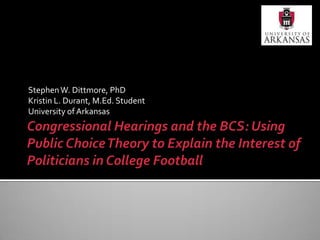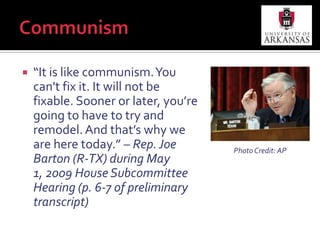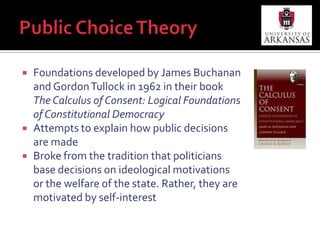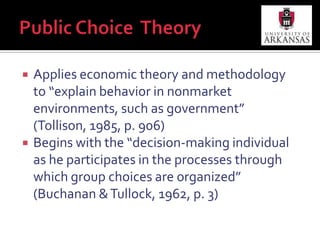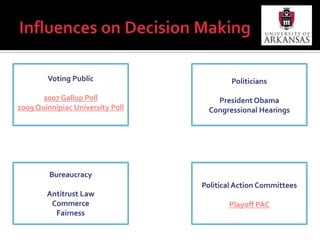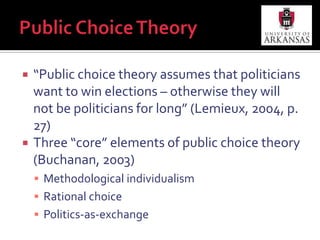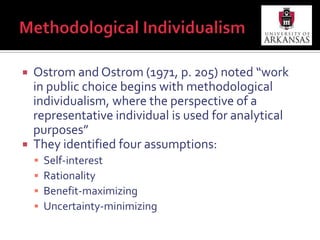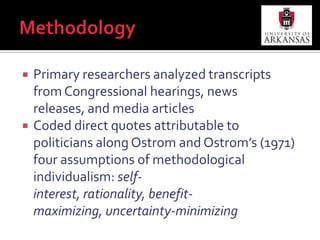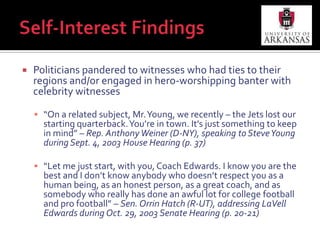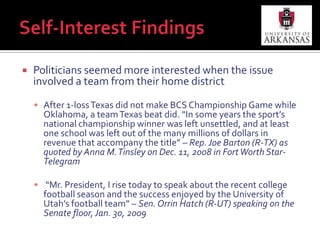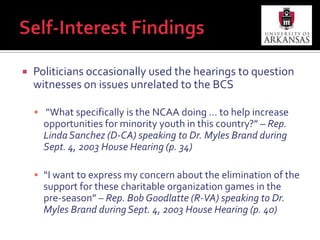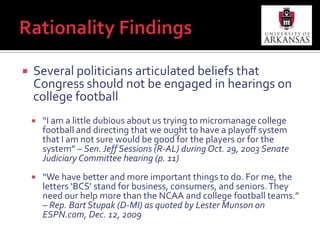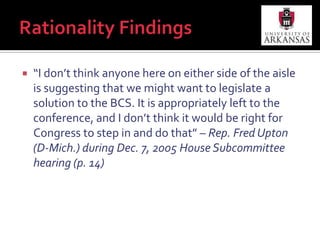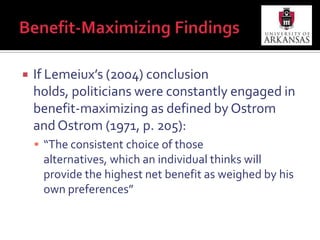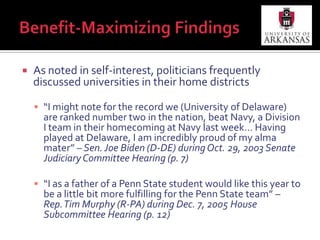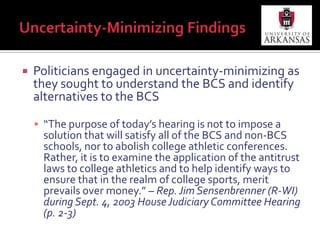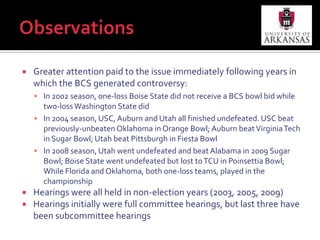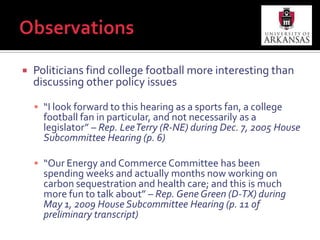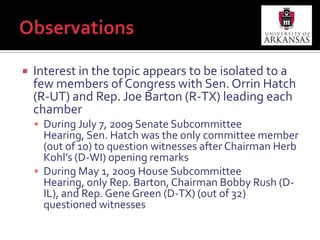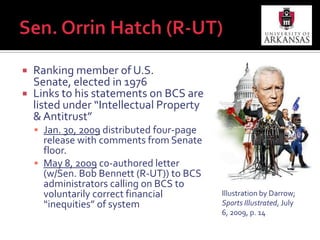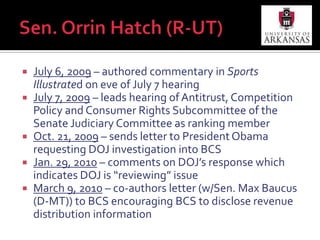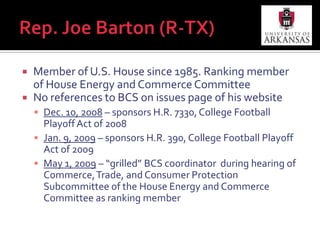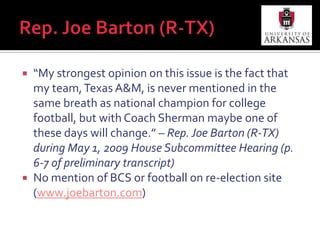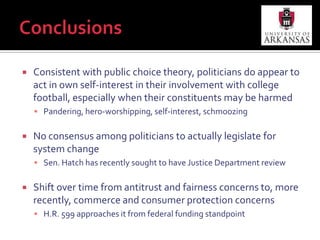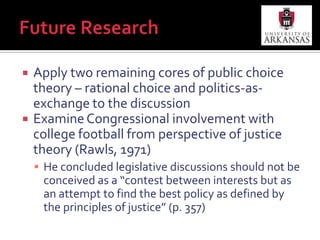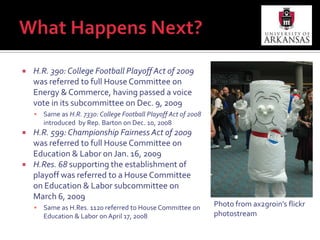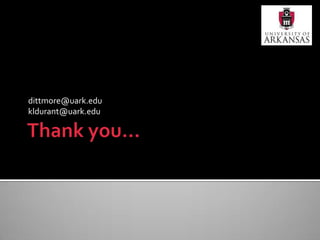Congressional Hearing and the BCS
- 1. Congressional Hearings and the BCS: Using Public Choice Theory to Explain the Interest of Politicians in College FootballStephen W. Dittmore, PhDKristin L. Durant, M.Ed. StudentUniversity of Arkansas
- 2. CommunismÔÇ£It is like communism. You can't fix it. It will not be fixable. Sooner or later, youÔÇÖre going to have to try and remodel. And thatÔÇÖs why we are here today.ÔÇØ ÔÇô Rep. Joe Barton (R-TX) during May 1, 2009 House Subcommittee Hearing (p. 6-7 of preliminary transcript)Photo Credit: AP
- 3. Public Choice TheoryFoundations developed by James Buchanan and Gordon Tullock in 1962 in their book The Calculus of Consent: Logical Foundations of Constitutional DemocracyAttempts to explain how public decisions are madeBroke from the tradition that politicians base decisions on ideological motivations or the welfare of the state. Rather, they are motivated by self-interest
- 4. Public Choice TheoryApplies economic theory and methodology to ÔÇ£explain behavior in nonmarket environments, such as governmentÔÇØ (Tollison, 1985, p. 906)Begins with the ÔÇ£decision-making individual as he participates in the processes through which group choices are organizedÔÇØ (Buchanan & Tullock, 1962, p. 3)
- 5. Influences on Decision MakingVoting Public2007 Gallup Poll2009 Quinnipiac University PollPoliticiansPresident ObamaCongressional HearingsBureaucracyAntitrust LawCommerceFairnessPolitical Action CommitteesPlayoff PAC
- 6. Public Choice TheoryÔÇ£Public choice theory assumes that politicians want to win elections ÔÇô otherwise they will not be politicians for longÔÇØ (Lemieux, 2004, p. 27)Three ÔÇ£coreÔÇØ elements of public choice theory (Buchanan, 2003)Methodological individualismRational choicePolitics-as-exchange
- 7. Methodological IndividualismOstrom and Ostrom (1971, p. 205) noted ÔÇ£work in public choice begins with methodological individualism, where the perspective of a representative individual is used for analytical purposesÔÇØ They identified four assumptions:Self-interestRationalityBenefit-maximizingUncertainty-minimizing
- 8. MethodologyPrimary researchers analyzed transcripts from Congressional hearings, news releases, and media articlesCoded direct quotes attributable to politicians along Ostrom and OstromÔÇÖs (1971) four assumptions of methodological individualism: self-interest, rationality, benefit-maximizing, uncertainty-minimizing
- 9. Self-Interest FindingsPoliticians pandered to witnesses who had ties to their regions and/or engaged in hero-worshipping banter with celebrity witnessesÔÇ£On a related subject, Mr. Young, we recently ÔÇô the Jets lost our starting quarterback. YouÔÇÖre in town. ItÔÇÖs just something to keep in mindÔÇØ ÔÇô Rep. Anthony Weiner (D-NY), speaking to Steve Young during Sept. 4, 2003 House Hearing (p. 37)ÔÇ£Let me just start, with you, Coach Edwards. I know you are the best and I donÔÇÖt know anybody who doesnÔÇÖt respect you as a human being, as an honest person, as a great coach, and as somebody who really has done an awful lot for college football and pro footballÔÇØ ÔÇô Sen. Orrin Hatch (R-UT), addressing LaVell Edwards during Oct. 29, 2003 Senate Hearing (p. 20-21)
- 10. Self-Interest FindingsPoliticians seemed more interested when the issue involved a team from their home districtAfter 1-loss Texas did not make BCS Championship Game while Oklahoma, a team Texas beat did. ÔÇ£In some years the sportÔÇÖs national championship winner was left unsettled, and at least one school was left out of the many millions of dollars in revenue that accompany the titleÔÇØ ÔÇô Rep. Joe Barton (R-TX) as quoted by Anna M. Tinsley on Dec. 11, 2008 in Fort Worth Star-Telegram ÔÇ£Mr. President, I rise today to speak about the recent college football season and the success enjoyed by the University of UtahÔÇÖs football teamÔÇØ ÔÇô Sen. Orrin Hatch (R-UT) speaking on the Senate floor, Jan. 30, 2009
- 11. Self-Interest FindingsPoliticians occasionally used the hearings to question witnesses on issues unrelated to the BCS What specifically is the NCAA doing  to help increase opportunities for minority youth in this country?  Rep. Linda Sanchez (D-CA) speaking to Dr. Myles Brand during Sept. 4, 2003 House Hearing (p. 34)I want to express my concern about the elimination of the support for these charitable organization games in the pre-season  Rep. Bob Goodlatte (R-VA) speaking to Dr. Myles Brand during Sept. 4, 2003 House Hearing (p. 40)
- 12. Rationality FindingsSeveral politicians articulated beliefs that Congress should not be engaged in hearings on college footballÔÇ£I am a little dubious about us trying to micromanage college football and directing that we ought to have a playoff system that I am not sure would be good for the players or for the systemÔÇØ ÔÇô Sen. Jeff Sessions (R-AL) during Oct. 29, 2003 Senate Judiciary Committee hearing (p. 11)
- 13. ÔÇ£We have better and more important things to do. For me, the letters ÔÇÿBCSÔÇÖ stand for business, consumers, and seniors. They need our help more than the NCAA and college football teams.ÔÇØ ÔÇô Rep. Bart Stupak (D-MI) as quoted by Lester Munson on ESPN.com, Dec. 12, 2009Rationality FindingsÔÇ£I donÔÇÖt think anyone here on either side of the aisle is suggesting that we might want to legislate a solution to the BCS. It is appropriately left to the conference, and I donÔÇÖt think it would be right for Congress to step in and do thatÔÇØ ÔÇô Rep. Fred Upton (D-Mich.) during Dec. 7, 2005 House Subcommittee hearing (p. 14)Benefit-Maximizing FindingsIf LemeiuxÔÇÖs (2004) conclusion holds, politicians were constantly engaged in benefit-maximizing as defined by Ostrom and Ostrom (1971, p. 205):ÔÇ£The consistent choice of those alternatives, which an individual thinks will provide the highest net benefit as weighed by his own preferencesÔÇØ
- 14. Benefit-Maximizing FindingsAs noted in self-interest, politicians frequently discussed universities in their home districtsI might note for the record we (University of Delaware) are ranked number two in the nation, beat Navy, a Division I team in their homecoming at Navy last week Having played at Delaware, I am incredibly proud of my alma mater  Sen. Joe Biden (D-DE) during Oct. 29, 2003 Senate Judiciary Committee Hearing (p. 7)I as a father of a Penn State student would like this year to be a little bit more fulfilling for the Penn State team  Rep. Tim Murphy (R-PA) during Dec. 7, 2005 House Subcommittee Hearing (p. 12)
- 15. Uncertainty-Minimizing FindingsPoliticians engaged in uncertainty-minimizing as they sought to understand the BCS and identify alternatives to the BCSÔÇ£The purpose of todayÔÇÖs hearing is not to impose a solution that will satisfy all of the BCS and non-BCS schools, nor to abolish college athletic conferences. Rather, it is to examine the application of the antitrust laws to college athletics and to help identify ways to ensure that in the realm of college sports, merit prevails over money.ÔÇØ ÔÇô Rep. Jim Sensenbrenner (R-WI)during Sept. 4, 2003 House Judiciary Committee Hearing (p. 2-3)
- 16. ObservationsGreater attention paid to the issue immediately following years in which the BCS generated controversy:In 2002 season, one-loss Boise State did not receive a BCS bowl bid while two-loss Washington State didIn 2004 season, USC, Auburn and Utah all finished undefeated. USC beat previously-unbeaten Oklahoma in Orange Bowl; Auburn beat Virginia Tech in Sugar Bowl; Utah beat Pittsburgh in Fiesta BowlIn 2008 season, Utah went undefeated and beat Alabama in 2009 Sugar Bowl; Boise State went undefeated but lost to TCU in Poinsettia Bowl; While Florida and Oklahoma, both one-loss teams, played in the championshipHearings were all held in non-election years (2003, 2005, 2009)Hearings initially were full committee hearings, but last three have been subcommittee hearings
- 17. ObservationsPoliticians find college football more interesting than discussing other policy issuesÔÇ£I look forward to this hearing as a sports fan, a college football fan in particular, and not necessarily as a legislatorÔÇØ ÔÇô Rep. Lee Terry (R-NE) during Dec. 7, 2005 House Subcommittee Hearing (p. 6)ÔÇ£Our Energy and Commerce Committee has been spending weeks and actually months now working on carbon sequestration and health care; and this is much more fun to talk aboutÔÇØ ÔÇô Rep. Gene Green (D-TX) during May 1, 2009 House Subcommittee Hearing (p. 11 of preliminary transcript)
- 18. ObservationsInterest in the topic appears to be isolated to a few members of Congress with Sen. Orrin Hatch (R-UT) and Rep. Joe Barton (R-TX) leading each chamberDuring July 7, 2009 Senate Subcommittee Hearing, Sen. Hatch was the only committee member (out of 10) to question witnesses after Chairman Herb KohlÔÇÖs (D-WI) opening remarksDuring May 1, 2009 House Subcommittee Hearing, only Rep. Barton, Chairman Bobby Rush (D-IL), and Rep. Gene Green (D-TX) (out of 32) questioned witnesses
- 19. Sen. Orrin Hatch (R-UT)Ranking member of U.S. Senate, elected in 1976Links to his statements on BCS are listed under ÔÇ£Intellectual Property & AntitrustÔÇØJan. 30, 2009 distributed four-page release with comments from Senate floor. May 8, 2009 c0-authored letter (w/Sen. Bob Bennett (R-UT)) to BCS administrators calling on BCS to voluntarily correct financial ÔÇ£inequitiesÔÇØ of systemIllustration by Darrow; Sports Illustrated, July 6, 2009, p. 14
- 20. Sen. Orrin Hatch (R-UT)July 6, 2009 ÔÇô authored commentary in Sports Illustrated on eve of July 7 hearingJuly 7, 2009 ÔÇô leads hearing of Antitrust, Competition Policy and Consumer Rights Subcommittee of the Senate Judiciary Committee as ranking memberOct. 21, 2009 ÔÇô sends letter to President Obama requesting DOJ investigation into BCSJan. 29, 2010 ÔÇô comments on DOJÔÇÖs response which indicates DOJ is ÔÇ£reviewingÔÇØ issueMarch 9, 2010 ÔÇô c0-authors letter (w/Sen. Max Baucus (D-MT)) to BCS encouraging BCS to disclose revenue distribution information
- 21. Rep. Joe Barton (R-TX)Member of U.S. House since 1985. Ranking member of House Energy and Commerce CommitteeNo references to BCS on issues page of his websiteDec. 10, 2008 ÔÇô sponsors H.R. 7330, College Football Playoff Act of 2008Jan. 9, 2009 ÔÇô sponsors H.R. 390, College Football Playoff Act of 2009May 1, 2009 ÔÇô ÔÇ£grilledÔÇØ BCS coordinator during hearing of Commerce, Trade, and Consumer Protection Subcommittee of the House Energy and Commerce Committee as ranking member
- 22. Rep. Joe Barton (R-TX)ÔÇ£My strongest opinion on this issue is the fact that my team, Texas A&M, is never mentioned in the same breath as national champion for college football, but with Coach Sherman maybe one of these days will change.ÔÇØ ÔÇô Rep. Joe Barton (R-TX) during May 1, 2009 House Subcommittee Hearing (p. 6-7 of preliminary transcript)No mention of BCS or football on re-election site (www.joebarton.com)
- 23. ConclusionsConsistent with public choice theory, politicians do appear to act in own self-interest in their involvement with college football, especially when their constituents may be harmedPandering, hero-worshipping, self-interest, schmoozingNo consensus among politicians to actually legislate for system changeSen. Hatch has recently sought to have Justice Department reviewShift over time from antitrust and fairness concerns to, more recently, commerce and consumer protection concernsH.R. 599 approaches it from federal funding standpoint
- 24. Future ResearchApply two remaining cores of public choice theory ÔÇô rational choice and politics-as-exchange to the discussionExamine Congressional involvement with college football from perspective of justice theory (Rawls, 1971)He concluded legislative discussions should not be conceived as a ÔÇ£contest between interests but as an attempt to find the best policy as defined by the principles of justiceÔÇØ (p. 357)
- 25. What Happens Next?H.R. 390: College Football Playoff Act of 2009 was referred to full House Committee on Energy & Commerce, having passed a voice vote in its subcommittee on Dec. 9, 2009Same as H.R. 7330: College Football Playoff Act of 2008 introduced by Rep. Barton on Dec. 10, 2008H.R. 599: Championship Fairness Act of 2009 was referred to full House Committee on Education & Labor on Jan. 16, 2009H.Res. 68 supporting the establishment of playoff was referred to a House Committee on Education & Labor subcommittee on March 6, 2009Same as H.Res. 1120 referred to House Committee on Education & Labor on April 17, 2008Photo from ax2groinÔÇÖs flickrphotostream
Editor's Notes
- #2: 5 hearing plus one markupAdditional hearing in May 1997 not included in analysis
- #4: ÔÇ£The basic behavioral postulate of public choice , as for economics, is that man is an egoistic, rational, utility maximizerÔÇØ (Mueller, 1976, p. 395)Public Choice Theory has been called ÔÇ£The application of the methodology of economics to the study of politicsÔÇØ (Mueller, 2004, p. 32)Involves the interaction of:Voting publicPoliticiansBureaucracyPolitical action committees
- #6: 2007 USA Today/Gallup College Football Fan poll taken Jan. 9-10, 2007, following BCS Championship Game on Jan. 8 following FloridaÔÇÖs win over Ohio State. USC was 3rd, LSU was 4th and Boise State was 5th. N = 481When asked about the best way to decide the national champion in college football, fans showed a strong preference for a playoff tournament. When given three options, 69% favored "a playoff tournament involving the top 4, 8, or 16 teams that would replace the bowl games." Just 15% say they favor "the current system, where the top two teams at the end of the regular season meet in one of the bowl games," and 16% favor the compromise "plus-one" system that would involve "a one-game playoff between the top two teams after all the bowl games have been played.ÔÇØWhich of the following would you prefer as the way to determine the national champion in college football?The current system where the top two teams at the end of the regular season meet in one of the bowl games (15%)A one-game playoff between the top two teams╠²after╠²all the bowl games have been played (16%)A playoff tournament involving the top 4, 8, or 16 teams that would replace the bowl games (69%)No opinion (1%)Quinnipiac University Poll taken Dec. 15-20, 2009What is your opinion of the Bowl Championship Series, or BCS, the system that college football uses to determine its national champion - favorable or unfavorable?Favorable (43%)Unfavorable (45%)DK/NA (12%)Congress is considering forcing college football to have a playoff system, like in basketball, to pick a national champion. Do you think this is a good idea or a bad idea?Good idea (45%)Bad idea (48%)DK/NA (7%)
- #8: Self-interest = not selfish; implies primarily that individuals each have their own preferences which affect the decisions they make and these preferences vary from individual to individualRationality = ability to rank all known alternatives available to the individual in a transitive mannerBenefit-maximizing = implies the consistent choice of those alternatives which an individual thinks will provide the highest net benefits as weighed by his own preferencesUncertainty-minimizing = certainty exists when: (a) an individual knows all available strategies; (b) each strategy is known to lead to invariably to only one specific outcome; and (c) the individual knows his own preferences for each outcome. Given this level of information, the individual simply chooses that strategy which leads to the outcome for which he has the highest preference.
- #10: Frequently referred to witnesses as my friend
- #11: "This year, we again have two teams with one loss each playing for the 'championship' while two undefeated teams and four additional teams with only one loss will play in bowl games, but none can become 'champion,'" said Barton, the senior Republican on the House Energy and Commerce Committee.Read more:╠²http://www.star-telegram.com/2008/12/11/1086514/rep-joe-barton-a-texas-aggie-proposes.html#ixzz0l6ylCP90
- #16: Likelihood this would lead to re-election
- #19: Diversion
- #20: Senate Subcommittee Hearing occurred immediately after July 4 recess and the week before hearings on the nomination of Sonia SotomayorHouse Subcommittee Hearing occurred on a Friday, right before a full committee hearing on cybersecurity
- #21: Received > 62% of vote each election since 1988. Up for re-election in 2012The first two pages congratulate Utah on a successful season, before addressing BCS directly
- #23: Elected in 1984
- #26: In this sense, Hatch has already shifted to justice
- #27: Nothing introduced in the SenateH.R. 390 College Football Playoff Act of 2009 - Prohibits promoting, marketing, or advertising a post-season National Collegiate Athletic Association (NCAA) Division Football Bowl Subdivision (FBS) game as a championship or national championship game (or any merchandise that refers to the game as a championship or national championship game) unless such game is the final game of a single elimination post-season playoff system for which all NCAA Division I FBS conferences and unaffiliated Division I FBS teams are eligible. Treats a violation as an unfair or deceptive act or practice under the Federal Trade Commission Act. Makes this Act applicable to any game that occurs after January 31, 2011.H.R. 599 Championship Fairness Act of 2009 - Prohibits an institution of higher education from receiving federal funds for any fiscal year during which it has a football team participating in the National Collegiate Athletic Association (NCAA) Division I Football Bowl Subdivision, unless such Subdivision's national championship game is the final game of a single elimination post-season playoff system.One of H.R. 599ÔÇÖs cosponsors, Neil Abercrombie (D-HI) recently announced his retirement
